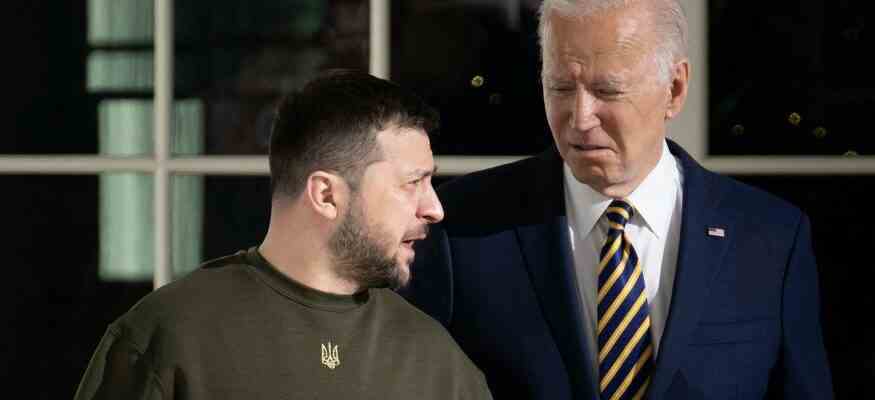The hero’s reception on the hill in Washington lasted only a few hours, then the US turned back to domestic problems: a cold front over the North American continent and Donald Trump’s tax debts. The political cold front over Europe will not go away either, even if – as Western analysts at least are certain – President Vladimir Putin can no longer win the war.
After ten months, Russia’s self-confidence and the planned demonstration of military rebirth resulted in a battle of attrition in which attackers and victims alike are stuck. Ukraine recorded at least one political success this week: a first-class demonstration of solidarity by the US President, who had previously avoided being close to his colleague from Kyiv.
After Volodymyr Zelensky returned from Washington and the American delivery list was examined more closely, the glass was once again half empty. Although Congress approved a staggering $47 billion in war aid for 2023 in its last night of session, the Ukrainian wish list published a few days ago by Zelenskiy’s adviser Mykhailo Podoljak remained largely unfulfilled: According to Ukrainian ideas, heavy weapons such as missile systems are missing to turn the dynamics of the war , drones, fighter planes or modern tanks like the American one M1 Abrams or the German one leopard 2. A single example of the anti-aircraft battery is now supplied patriot.
Biden is also concerned about cohesion in NATO
Biden’s decision is interpreted in detail in Washington’s spin orbit: Airfields, supply depots and missile stations on Russian territory could be attacked with short-range missiles, but the escalation could not be controlled. The same applies to aircraft, the technology of which should not fall into Russia’s hands. According to Washington, the Ukrainian army has enough tanks, and the M1 could not be operated without extensive training, let alone maintained. Of course, the partners (vulgo Germany) are free to deliver their modern devices.
Ukraine is stuck in the well-known dilemma: although you have strong allies, they want to help control the war from afar and, above all, prevent it from escalating. Biden is also concerned about cohesion in NATO, because quite a few alliance members want more, not less, distance from the front. And the US government is still reeling from the experience of the previous president, Barack Obama, who stayed out of the Ukraine conflict and the Syrian civil war out of consideration for the isolationist mood in the country. Americans have not yet regained interest in the world.
If there can be no military decision, prolonging the fighting will only lead to more suffering
Measured against Obama’s foreign policy, Biden has certainly pulled new strings and re-established the United States’ claim to leadership. In Europe it was noted with disapproval that Zelensky had only traveled to Washington but not to Brussels. The indispensability of the US to Europe could not have been demonstrated more clearly. Overall, Biden can look back on a successful year in foreign policy: Russia is largely isolated, and it is difficult to imagine a return to the family of states. China’s leadership has fallen into the self-made Covid trap and can now choose whether to draw the displeasure of its own people because of uncontrollable waves of infection or serious economic damage. In any case, Biden will use the weakness of party leader Xi Jinping. The conflict between democratic and authoritarian states, which has been looming for years, and consequently the superpower rivalry between the USA and China – it suddenly seems to have been postponed.
But how, according to the Biden government, should this dispute over supremacy in Europe be ended, how should Russia be persuaded to withdraw and start peace negotiations? US Chief of Staff Mark Milley irritated observers in November when he declared the war militarily unwinnable – neither for Russia nor for Ukraine itself. In fact, the slaughter at the front continues unhindered, but neither side benefits from it.
Milley’s analysis goes further: if there can be no military decision, then prolonging the fighting will only lead to more suffering and political and economic collateral damage. It was not reported after the meeting whether Biden and Zelenskiy found a solution to this dilemma.

